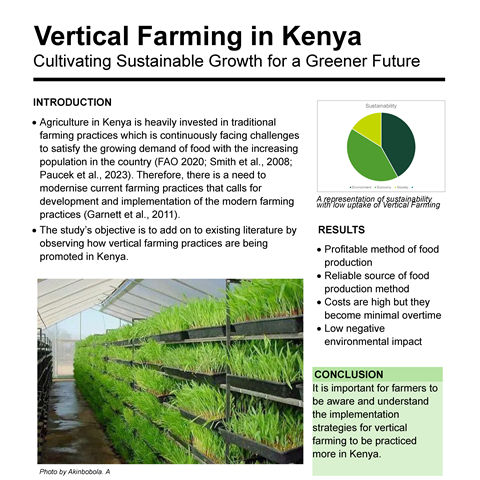The Uptake of Vertical Farming Practices in Kenya – A case study on Tatton Agriculture Park is a research paper that explores the adoption of vertical farming practices in Kenya. The study focuses on Tatton Agriculture Park, a leading vertical farming company in Kenya.
Vertical farming is a method of growing plants in vertically stacked layers, often in indoor environments. This approach has gained popularity in recent years due to its potential to increase crop yields while reducing land use and environmental impact.
Methodology
The study employed a mixed-methods approach, combining both qualitative and quantitative data collection and analysis methods. The researchers conducted interviews with key stakeholders, including farmers, policymakers, and industry experts, to gather insights on the current state of vertical farming in Kenya.
Findings
The study found that vertical farming has the potential to increase crop yields by up to 30% compared to traditional farming methods. Additionally, the study revealed that vertical farming can reduce water consumption by up to 90% and energy consumption by up to 70%.
Conclusion
The study concludes that vertical farming is a viable and sustainable solution for Kenya’s agricultural sector. The findings suggest that the adoption of vertical farming practices can help address the country’s food security challenges while reducing its environmental impact.
As the world’s population continues to grow, it is essential to find innovative and sustainable solutions to meet the increasing demand for food. Vertical farming is one such solution that has the potential to transform the agricultural sector.
The study’s findings have significant implications for policymakers, farmers, and industry stakeholders. The results suggest that vertical farming can play a critical role in achieving Kenya’s food security goals while promoting sustainable agriculture practices.
Recommendations
The study recommends that policymakers and industry stakeholders work together to create an enabling environment for the adoption of vertical farming practices in Kenya. This can be achieved through the provision of incentives, training, and technical support to farmers and other stakeholders.
The study also recommends that farmers and industry stakeholders invest in research and development to improve the efficiency and sustainability of vertical farming practices.
The future of agriculture is vertical, and it is essential that we work together to make it a reality.









